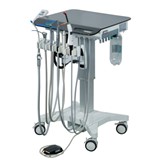Here are five medical breakthroughs that may have escaped your notice.
Genes found related to epilepsy provide specific treatment options
Two neurologists, Ingrid Scheffer and Sam Berkovic, have found certain genes to be associated with epilepsy. Whilst the puzzle is not clear-cut, this provides an opportunity to use treatments specific for the genes to blame for individuals with epilepsy. This has the potential to provide more effective epilepsy treatments with fewer adverse effects in the future.
Read more about genetic findings and treatment for epilepsy
Superbug antibacterial gel

The innovative antibacterial gel could help to significantly reduce hospital-acquired infections, as it is effective against pseudomonas aeruginosa, staphylococci and Escherichia coli. These bacteria are commonly to blame for infections within a clinical environment and previously antibacterial gels available were unable to combat these infections.
Read more about hospital infections and antibacterial gel
Immunotherapy for progressive multiple sclerosis treatment
Currently people with progressive multiple sclerosis are without options for disease-modifying treatments, although that might be about to change with the new EBV-specific adoptive immunotherapy. T-cells were taken from one patient and exposed to the Epstein-Barr Virus vaccine, then transferred back to the patient via intravenous infusion. This first patient experienced sustainable improvement without noticeable adverse effects, suggesting treatment could be developed in this area.
Read more about treatment for progressive multiple sclerosis
New treatment methods for leukemia therapy
Adelaide researchers are looking further into a new approach to killing cancer cells for patients with chronic myeloid leukemia by blocking a protein and causing the cells to kill themselves. This treatment could possibly also be used for other forms of cancer and is being targeted in research to discover more effective treatments.
Read more about revolutionary treatment for leukemia
Heart transplant with already dead hearts

Up until recently, heart transplant could only take place with donors who still had beating hearts but were terminally brain dead. However, a recent breakthrough in Australia led to the use of hearts that have already stopped beating in heart transplants. This is likely to increase the number of available heart donors greatly, allowing 30 per cent more heart transplants to take place and lives to be saved.








-160x160-state_article-rel-cat.png)












